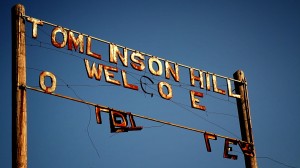
Reporter
The documentary, “Tomlinson Hill,” a movie focused on race, social justice, and rural decline, will have a private screening for Baylor students at 6:30 p.m. on Monday in the Packard Lecture Hall in the Marrs McLean Science building.
“It shows the present-ness of the past,” said Dr. Stephen Sloan, the director of Baylor’s Institute for Oral History and a professor at Baylor. “There’s a quote that says, ‘The past is never past.’ The way in which these stories seem quite distant in the past – those themes and forces and trends are a thread that runs through to our present situation.”
“Tomlinson Hill” focuses on the journey of Chris Tomlinson, the descendant of slave owners at the plantation, Tomlinson Hill, outside of Marlin. The film discusses the importance of connecting with the past and finding the truth.
“The film looks at Marlin, Texas, where my family once lived and operated a slave plantation outside of town,” said Tomlinson, the producer and chief subject of the film. “It follows me as I go to Falls County for the first time. It also follows a woman named Loreane Tomlinson, whose family’s descended from the slaves that my family once owned.”
The hour-long documentary is comprised of a series of interviews conducted with the advisement of Sloan. All of the interviews that were recorded will reside permanently in the Institute for Oral History.
“I just met with them and talked to them about their approach and things they should think about with running the project and working with local communities in this area,” Sloan said. “They wanted someone who has experience in Central Texas.”
Chris Tomlinson met with Loreane Tomlinson during the film’s creation. Loreane is a descendant of the slaves that became Tomlinsons after being granted freedom.
“My great-great-grandparents were slave owners, and her family were slaves,” Tomlinson said. “When they received their freedom, they took their owner’s names as their own.”
For generations until present day, there have been two branches of Tomlinsons, one black and one white. The documentary focuses on themes like racial segregation and poverty.
“The film looks at how the legacy of slavery and segregation still shapes lives in a small town in Texas today,” Tomlinson said. “It examines how hard it is to fight poverty. But it also shows how far we’ve come in terms of racial relations in America.”
Sloan said he enjoyed working on the movie because gathering oral history is what he loves to do. He said the themes in the film are applicable to our lives.
“We’re going back and looking at his story, which is also our story of issues of race and identity and home over the past 150 years,” Sloan said. “He’s telling a story that’s very much an American narrative.”
The documentary won the silver heart award at the Dallas Film Festival earlier this year. According to the Dallas Film Festival website, “the Silver Heart Award is bestowed on an individual or film for their dedication to fighting injustices and/or creating social change for the improvement of humanity.”
Tomlinson has written a book, also called “Tomlinson Hill,” that will be published in the spring of 2014. LaDainian Tomlinson wrote the foreword to the book. LaDainian is an African American Tomlinson who played professional football for the San Diego Chargers and the New York Jets.
“The book begins when the first Tomlinson comes to Texas in 1849 to Falls County,” Tomlinson said. “It follows the two families, both named Tomlinson, one black and one white, from that day until the last Tomlinson on Tomlinson Hill died in 2007.”
Besides working on and producing the film, Tomlinson is currently the Austin bureau chief for the Associated Press. He worked as a foreign correspondent for 14 years. He has received numerous awards for his writing and has been nominated twice for the Pulitzer Prize.
“I’ve covered nine wars,” Tomlinson said. “That experience inspired me to examine my family’s history of ethnic violence.”
Sloan said that students should come to the screening expecting to be challenged by the deep themes, like racism and social injustince, in the film. Tomlinson also said that students should be prepared to ask questions about their own past.
“I hope that everyone will go home and ask their elders to tell them about their family’s history, both good and bad,” Tomlinson said. “I hope that people will come to appreciate that history is alive in everyone of us, and we can’t escape it. But, we can build a better future. When you know your history, it makes you more confident about who you are and where you come from, even if some of that history is ugly.”






